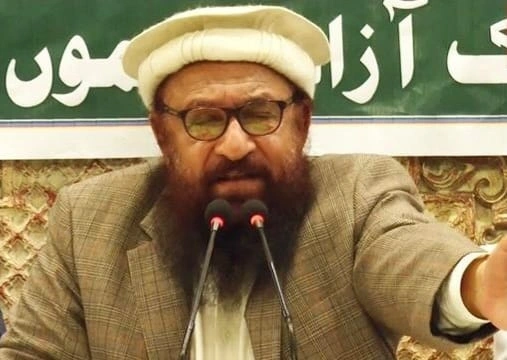

Pakistan-based terrorist Abdul Rehman Makki
Several factors have gone into forcing China to lift its “technical hold” on blacklisting Abdul Rehman Makki, the second in command of the Lashkar-e-Tayyaba (LeT) and the group’s ace financier, as a global terrorist.
The Chinese relented after 14 out of the 15 members of the UN Security Council’s 1267 committee were in favour of designating Makki as global terrorist, isolating Beijing. Deeply averse to international isolation and a negative global image of a terror-supporter, not only among the US-led G-7 countries, but also in the Global South, the Chinese had no option but to relent. Supporting iron-brother Pakistan was simply not worth it when the rest of the world was uniting against terror.
The major takeaway from yesterday’s voting is that China will relent only under extreme pressure. That is the template that New India cannot lose sight of especially when bigger challenges continue to fester along the Line of Actual Control (LAC) and in the maritime domain of the Indian Ocean. India’s marathon with China has only begun.
There are at least four other factors which coaxed China to mark a tactical retreat vis-à-vis Pakistan on Makki.
First, India’s zero- tolerance against Pak-sponsored terror has begun to work on the ground. Despite superficial statements from vested quarters, hostile mainstream western media and fifth columnists within India, the Modi-government’s sustained offensive against terror in Kashmir is demonstrating New India’s iron-will to go for the jugular of extremism, whatever be the costs. India’s relentless fight against terror in Kashmir is evoking both overt and grudging respect among friends and foes, despite churlish howls against “Hindu nationalists” by some human rights groups.
Second, India has effectively joined the information war in its global counter-terror strategy. For instance, Vivek Agnihotri’s Kashmir Files has played a massive role in contesting the popular international narrative at a mass-level that Kashmir was all about denial of human rights and self-determination. Instead Agnihotri’s film convincingly argues that the so-called Kashmir Jihad was not about freedom but genocide of Kashmiri pandits whose pogrom was nowhere on the national and international radar. Kashmir Files has proved a major force multiplier in baring the Pakistani deep-state’s conspiracy to use terror to meet its nefarious goals, and generating a lively debate on the reality of Kashmir.
Third, the Modi government’s whole-of- government approach has been a major factor in changing international perceptions on terror. While the security forces did their work on the ground, the diplomats and the agencies had launched their own counteroffensive against terror, with the carnage of 26/11 in Mumbai as the focal point.
In October, India hosted a major UN Security Council’s anti-terrorism meeting. Importantly, the conference was held at Mumbai’s Taj Mahal hotel—the scene of the carnage in 2008, fuelling fresh outrage against the horrendous crime.
Prime Minister Narendra Modi is on record saying that New Delhi was in no mood to forget 26/11 and move on. Instead, he has stressed in a tweet that, “India can’t forget the wounds of the Mumbai attacks. Now, today’s India is combating terrorism with a new policy and new ways.”
In a similar vein, defence minister Rajnath Singh has asserted that, “This country has not forgotten the incident of 26/11, nor will it ever forget.”
Fourth, China’s isolation at the UN on terror is also an endorsement of India’s strategic autonomy and recognition that its international diplomacy has to take cognizance of the diffusion of global power in a multipolar world. While the US and France played a key role, the Modi-government’s neutrality on the Ukraine crisis simultaneously ensured Russian support as well. Besides New Delhi’s deep engagement with the Gulf Muslim countries and the Global South buttressed by the Covid-diplomacy ensured that most emerging economies and the Global South stood by India, effectively marginalising the nexus between China and Pakistan.
With India making it plain to Xinjiang-impacted China that it will be vocal in exposing Beijing’s complicity with terror in the world, the stage is now set for the next steps in the long war against terrorism. From India’s perspective, it is now urgent that China does not come in the way of ensuring a UN-ban on other Pak-backed luminaries occupying the rogue’s gallery. These include Sajid Mir, the handler of the 26/11 attackers, Talah Saeed, son of LeT founder Hafez Saeed, and Jaish-e-Mohammed terror leader Mufti Rauf Azhar. Pakistan had declared Mir dead, but had to acknowledge his presence on its soil under pressure from the Financial Action Task Force (FATF). The tale of smoke-and-mirrors is slowly but surely getting exposed.
Also Read: UN blacklists Pakistan’s Abdul Rehman Makki as global terrorist
Political activist from Pakistan-occupied Jammu Kashmir (PoJK), Amjad Ayub Mirza, has condemned China's involvement in…
Bhutan Prime Minister Tshering Tobgay has said that he considers Prime Minister Narendra Modi as…
Prime Minister Narendra Modi met the Chief Advisor of the government of Bangladesh, Muhammad Yunus…
The Cabinet Committee on Economic Affairs, chaired by the Prime Minister Narendra Modi, has approved…
Prime Minister Narendra Modi on Friday met with Bangladesh's chief advisor Muhammad Yunus for the…
Ambassador of India to Myanmar, Abhay Thakur said on Friday that under Prime Minister Narendra…